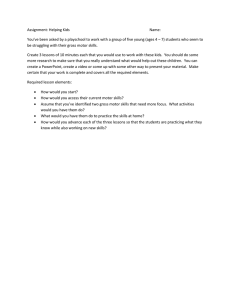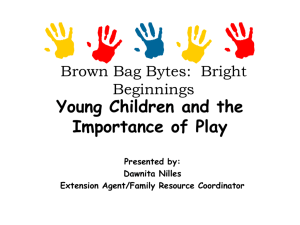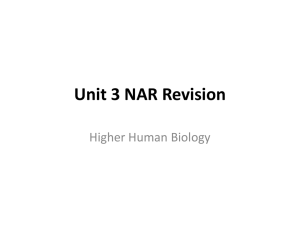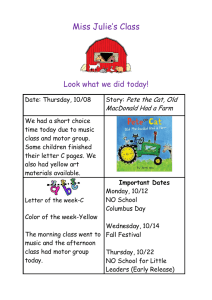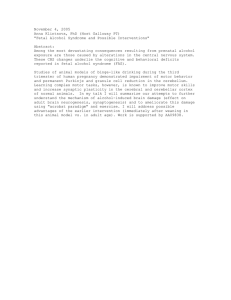Motor Control Training Adaptations Dr. Suzan Ayers HPER 6310
advertisement
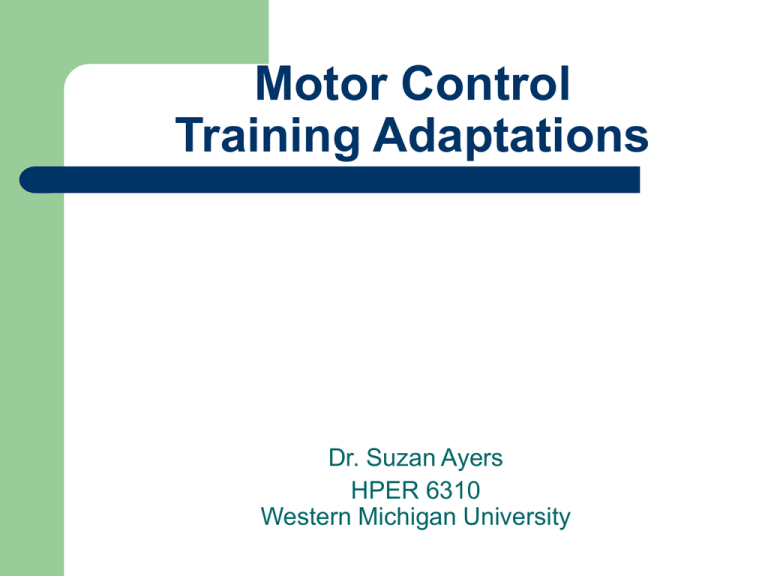
Motor Control Training Adaptations Dr. Suzan Ayers HPER 6310 Western Michigan University Lecture Overview Changes in observable motor performance Changes at the neurophysiological level Changes in information-processing capabilities Factors affecting the learning of motor skills Learning: a relatively permanent change in performance due to practice/experience Characteristics of Skilled Performance Skilled performance Ability to attain desired result with minimum time/effort Experts (10 yrs 10,000 hrs millions of trials) Have ‘all the time in the world’ Make good decisions ‘Read’ situations well Have consistent yet adaptable performances Do many things automatically Are fast and accurate Are maximally effective with minimum attention/effort Stages in Motor Skill Acquisition Stage 1: Verbal-Cognitive Completely novel task Thinking and planning movement strategies central focus Good verbal instruction & demonstrations very beneficial Stage 2: Associative Single strategy/approach to task selected “Fine-tuning” movement pattern & adjust to conditions Specific task practice most useful Practicing progressively more complex tasks helpful Stage 3: Autonomous/Automatic Skill performance largely automatic Difficult to ‘unlearn’ incorrect technique Movement below conscious level (multi-taskable) Motor skills are NOT generalizeable Neurophysiological Adaptations Plasticity Experience influences perception, decision-making and performance by making physical changes in neural pathways Brain particularly plastic during early years, critical periods Plasticity decreases but does not disappear with age Neural Circuitry Changes Neuron response characteristics (speed, activation) Establishment of new synaptic connections (new tasks produce new pathways) Synaptic response characteristics (increased sensitivity) Information-Processing Adaptations Sensory reception Experts/Novices the same (what is done w/ input the issue) Perception Experts have superior pattern recognition skills Experts can more accurately predict forthcoming events Information processing skills highly refined in experts Novice’s limited ability to interpret, understand and use information to guide decision making & execution Decision Making Experts’ ability to predict actions allows them to ↓ options in decision-making process, therefore make more accurate decisions Organization & Execution Experts develop more advanced motor programs, therefore ↓ demands on information processing system allowing attention for other tasks Observable Movement Patterns/Outcomes Experts capable of producing exactly desired outcomes on a consistent basis More consistent: movement duration, trajectories, displacementtime characteristics, force-time curves More efficient use of external forces while minimizing detracting internal forces More discrete neuromuscular recruitment patterns SO WHAT? Training perception and decisionmaking skills is key to developing expertise Factors Affecting the Learning of Motor Skills Practice volume is a key discriminator between novices and experts Practice is necessary but not sufficient for learning Motor skills improve but never become “perfect” Feedback is critical for learning More specific & from learner’s perspective is better Limited to key features of performance Summary feedback @ end of trial block better Practice type is key Specific to applied task (game-like settings) Degree of drill-like repetition Blocked (repetition of same skill for a period) Variable/Random (same skill practiced in different conditions) Practice organization over time Distributed (practice over several shorter sessions) Massed (continuous practice of a skill for a long period) Blocked valuable early (Stage 1) Variable & distributed produce most retention Speed first then accuracy Explicit learning can produce “paralysis by analysis” Movement skill and performance knowledge acquired together Implicit learning good for cognitive tasks, tentatively supported for motor tasks Distract conscious attention away from task at hand Minimize verbal instruction Resistant to forgetting and stress/anxiety

